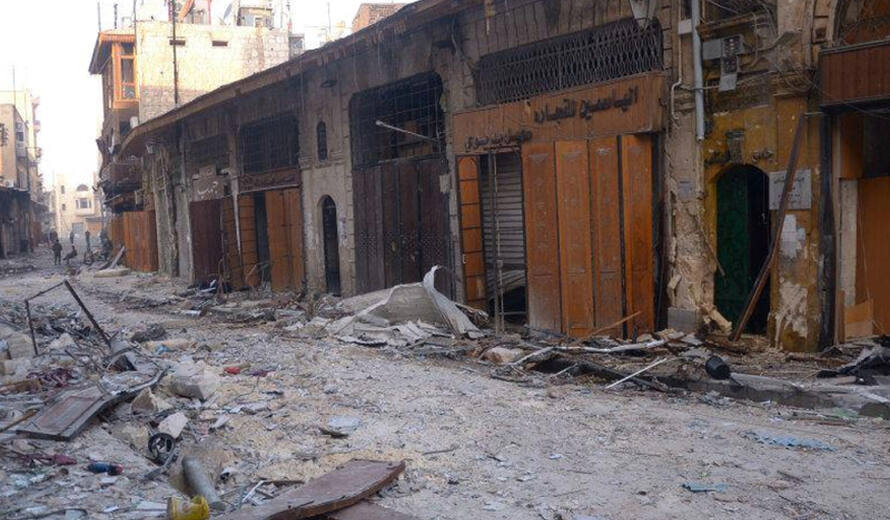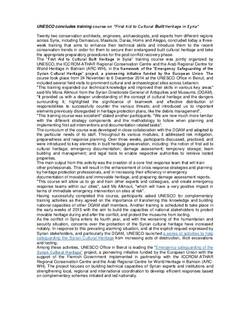UNESCO concludes training course on “First Aid to Cultural Built Heritage in Syria”
Twenty-two conservation architects, engineers, archaeologists, and experts from different regions across Syria, including Damascus, Maaloula, Daraa, Homs and Aleppo, concluded today a three-week training course that aims to enhance their technical skills and introduce them to the recent conservation trends in order for them to secure their endangered built cultural heritage and take the appropriate preparatory procedures for the post-conflict recovery phase.
The “First Aid to Cultural Built Heritage in Syria” training course was jointly organized by UNESCO, the ICCROM-ATHAR Regional Conservation Centre and the Arab Regional Centre for World Heritage in Bahrain (ARC-WH), in the framework of the “Emergency Safeguarding of the Syrian Cultural Heritage” project, a pioneering initiative funded by the European Union. The course took place from 24 November to 6 December 2014 at the UNESCO Office in Beirut, and included several field visits to prominent cultural and archaeological sites across Lebanon.
"This training expanded our technical knowledge and improved their skills in various key areas," said Ms Mona Alkhouli from the Syrian Directorate General of Antiquities and Museums (DGAM). "It provided us with a deeper understanding of the concept of cultural heritage and the dangers surrounding it; highlighted the significance of teamwork and effective distribution of responsibilities to successfully counter the various threats; and introduced us to important elements previously disregarded in heritage protection plans, like the debris management."
"This training course was excellent," stated another participant. "We are now much more familiar with the different strategy components and the methodology to follow when planning and implementing first aid interventions and documentation related tasks". The curriculum of the course was developed in close collaboration with the DGAM and adapted to the particular needs of its staff. Throughout its various modules, it addressed risk mitigation, preparedness and response planning. Over three weeks, participants discussed, practiced, and were introduced to key elements in built heritage preservation, including: the notion of first aid to cultural heritage; emergency documentation; damage assessment; temporary storage; team building and management; and legal tools to enable respective authorities to retrieve looted properties.
The main output from this activity was the creation of a core first response team that will train other professionals. This will result in the enhancement of crisis response strategies and planning by heritage protection professionals, and in increasing their efficiency in emergency documentation of movable and immovable heritage, and preparing damage assessment reports. "This course will allow us to go and train other experts and colleagues, and create emergency
response teams within our cities," said Ms Alkhouli, "which will have a very positive impact in terms of immediate emergency intervention on sites at risk."
Having successfully completed this course, participants asked UNESCO for complementary training activities as they agreed on the importance of transferring this knowledge and building national capacities of other DGAM staff members. Another training course is scheduled to take place in the early weeks of 2015 with the aim to build the capacities of national stakeholders to protect movable heritage during and after the conflict, and protect the museums from looting. As the conflict in Syria enters its fourth year, and with the worsening of the humanitarian and security situation, concerns over the protection of the Syrian cultural heritage have increased notably. In response to this prevailing alarming situation, and at the explicit request expressed by Syrian stakeholders, and particularly the DGAM, UNESCO launched a series of activities to help safeguarding the Syrian Cultural Heritage from increasing acts of destruction, illicit excavations and looting.
Among these activities, UNESCO Office in Beirut is leading the “Emergency safeguarding of the Syrian Cultural Heritage” project, a pioneering initiative funded by the European Union with the support of the Flemish Government implemented in partnership with the ICCROM-ATHAR Regional Conservation Centre and the Arab Regional Centre for World Heritage in Bahrain (ARCWH). The project focuses on building technical capacities of Syrian experts and institutions and strengthening local, regional and international coordination to develop efficient responses based on complementary schemes initiated and led nationally.
The “First Aid to Cultural Built Heritage in Syria” training course was jointly organized by UNESCO, the ICCROM-ATHAR Regional Conservation Centre and the Arab Regional Centre for World Heritage in Bahrain (ARC-WH), in the framework of the “Emergency Safeguarding of the Syrian Cultural Heritage” project, a pioneering initiative funded by the European Union. The course took place from 24 November to 6 December 2014 at the UNESCO Office in Beirut, and included several field visits to prominent cultural and archaeological sites across Lebanon.
"This training expanded our technical knowledge and improved their skills in various key areas," said Ms Mona Alkhouli from the Syrian Directorate General of Antiquities and Museums (DGAM). "It provided us with a deeper understanding of the concept of cultural heritage and the dangers surrounding it; highlighted the significance of teamwork and effective distribution of responsibilities to successfully counter the various threats; and introduced us to important elements previously disregarded in heritage protection plans, like the debris management."
"This training course was excellent," stated another participant. "We are now much more familiar with the different strategy components and the methodology to follow when planning and implementing first aid interventions and documentation related tasks". The curriculum of the course was developed in close collaboration with the DGAM and adapted to the particular needs of its staff. Throughout its various modules, it addressed risk mitigation, preparedness and response planning. Over three weeks, participants discussed, practiced, and were introduced to key elements in built heritage preservation, including: the notion of first aid to cultural heritage; emergency documentation; damage assessment; temporary storage; team building and management; and legal tools to enable respective authorities to retrieve looted properties.
The main output from this activity was the creation of a core first response team that will train other professionals. This will result in the enhancement of crisis response strategies and planning by heritage protection professionals, and in increasing their efficiency in emergency documentation of movable and immovable heritage, and preparing damage assessment reports. "This course will allow us to go and train other experts and colleagues, and create emergency
response teams within our cities," said Ms Alkhouli, "which will have a very positive impact in terms of immediate emergency intervention on sites at risk."
Having successfully completed this course, participants asked UNESCO for complementary training activities as they agreed on the importance of transferring this knowledge and building national capacities of other DGAM staff members. Another training course is scheduled to take place in the early weeks of 2015 with the aim to build the capacities of national stakeholders to protect movable heritage during and after the conflict, and protect the museums from looting. As the conflict in Syria enters its fourth year, and with the worsening of the humanitarian and security situation, concerns over the protection of the Syrian cultural heritage have increased notably. In response to this prevailing alarming situation, and at the explicit request expressed by Syrian stakeholders, and particularly the DGAM, UNESCO launched a series of activities to help safeguarding the Syrian Cultural Heritage from increasing acts of destruction, illicit excavations and looting.
Among these activities, UNESCO Office in Beirut is leading the “Emergency safeguarding of the Syrian Cultural Heritage” project, a pioneering initiative funded by the European Union with the support of the Flemish Government implemented in partnership with the ICCROM-ATHAR Regional Conservation Centre and the Arab Regional Centre for World Heritage in Bahrain (ARCWH). The project focuses on building technical capacities of Syrian experts and institutions and strengthening local, regional and international coordination to develop efficient responses based on complementary schemes initiated and led nationally.

